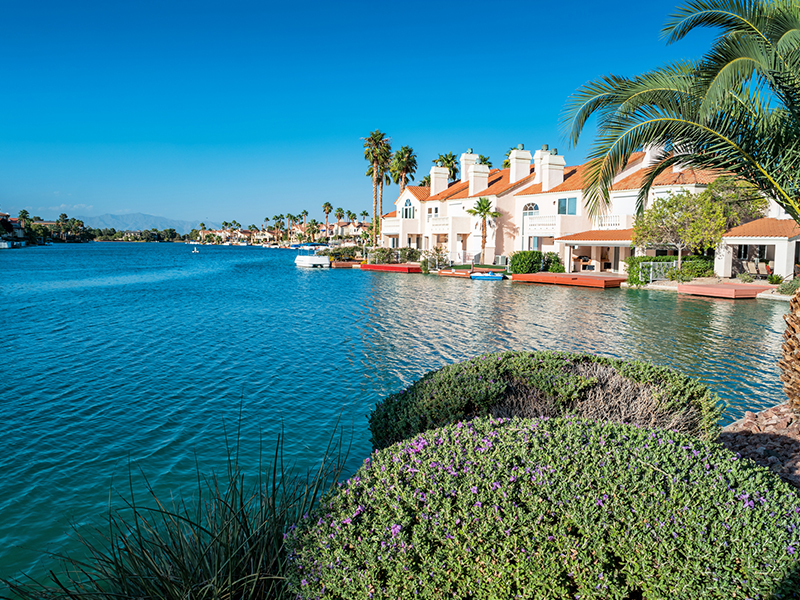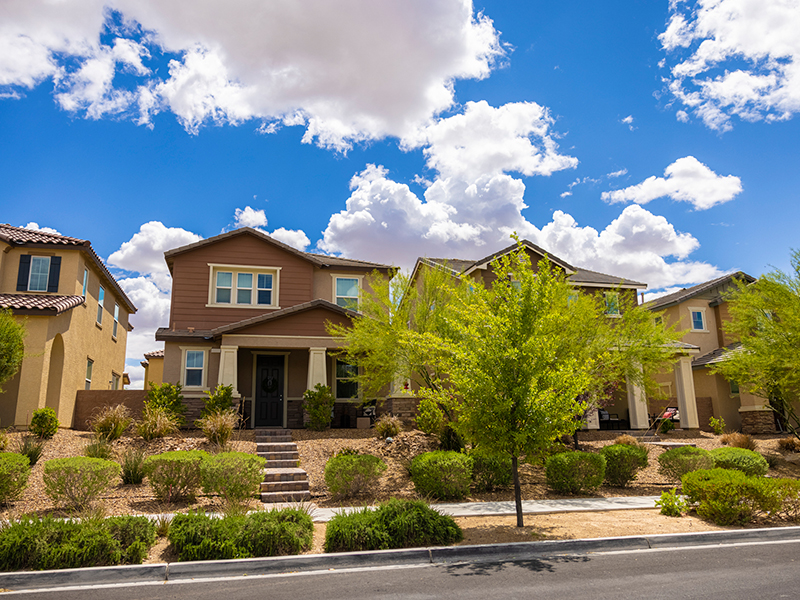
Las Vegas has always been a shining beacon for those who want to live a luxurious lifestyle, which is why it remains one of the top destinations in the country. As of August 2022, the city welcomed 25.2 million visitors. Based on projections, Las Vegas is expected to host a grand total of over 37 million tourists this year.
With this amazing volume, it is easy to see why hotels and guest accommodations are almost always fully booked in Las Vegas. But if you are constantly traveling to Las Vegas and consider it as your second home, why not get a vacation property? Continue reading to learn the merits and disadvantages of owning and renting a vacation home in Las Vegas.
Table of Contents
PROS AND CONS OF RENTING A VACATION HOME IN LAS VEGAS
Renting a vacation home in a city that is as dynamic and vibrant as Las Vegas comes with its own set of benefits and drawbacks. All of these should be considered before signing a lease.
Advantages
- Renting is easier on the pocket – Contrary to what most people think, there are several financial benefits to renting a vacation home. For instance, renters typically pay a much smaller deposit upfront compared to homebuyers, who have to shell out a sizable down payment equal to about 20% of their desired property. Depending on the length of your intended stay, you might pay lower insurance and utility costs or none at all— some short-term rentals already include these fees in the nightly rate.
- Renting demands less commitment – One advantage of renting a vacation home is that you will not have to worry about paying for repairs or maintenance. These are assumed by the landlord or property owner. Granted, you may have to shoulder some expenses in the event you break something. In addition, most vacation rentals come furnished, so you will not need to worry about purchasing any furniture or appliances for the space.
- Renting offers flexibility – A key benefit to renting is the flexibility it can give you. For instance, should a particular Las Vegas neighborhood ever become too rowdy to live in, you can simply move to a more favorable location whereas homeowners are restricted and may have to sell to relocate. You also have the option to design your vacation by finding a vacation rental that suits the theme of your trip, your activities, as well as your budget.
Disadvantages
- Landlords are free to increase rent at any time – Perhaps one of the biggest drawbacks that people face when renting is the possibility of rent hikes. This is particularly true in Las Vegas, which is not a rent-stabilized city. On the subject of vacation rentals, landlords can adjust rates depending on the season. For instance, summer and festivities, such as July the 4th and Labor Day weekend, may command higher prices.
- Renters do not experience the same financial benefits as homeowners – Homeownership is tied to a wide range of financial benefits, most of which are not available to renters. What you pay to use the vacation rental does not build equity, for instance. It just funds your stay in the property. Moreover, you cannot file for tax deductions even if you booked the vacation rental for an extended stay.

PROS AND CONS OF OWNING A VACATION HOME IN LAS VEGAS
Before visiting your Realtor to look at listings, you should think about the advantages and disadvantages of purchasing a vacation home in Las Vegas. Here are a few examples.
Advantages
- Buying a vacation home presents several investment opportunities – One of the key reasons that people buy real estate properties like vacation homes in Las Vegas is the number of financial benefits that they can enjoy. These include tax write-offs, credit score improvement, and building equity. In the case of a vacation rental, you stand to create an additional income revenue stream by catering to the millions of tourists Las Vegas attracts each year whenever you are not using the property.
If this is a part of your plans, you will have to be smarter about the home you purchase. You are not only buying for yourself, but for your potential market as well. Identify key locations in Las Vegas that will allow you to reach both your personal and business goals.
- Buying a vacation home gives you greater privacy and control of your space – As the owner, you can design your vacation home in Las Vegas according to your personal tastes. You can also do whatever you want, from hosting summer parties to bringing pets. This is in great contrast to renting a vacation rental, where you are explicitly given a set of rules to follow for the duration of your stay.
- Having your own vacation home makes holidays more convenient – You’re your own vacation property, you will always have a place to stay in Las Vegas regardless of the time or season. This saves you not just from the expense of paying for overpriced hotel rooms and other lodgings, but also from the hassle that comes with competing for accommodations with thousands of tourists.
Disadvantages
- You will have to contend with maintenance and costs – Like your primary residence, your vacation home will require regular upkeep and repairs to ensure you can enjoy it for years.
Maintenance is all the more important if you have decided to open your vacation residence as a short-term vacation rental— it will be subject to more wear and tear. Add-on fees on top of nightly rates can help cover maintenance expenses after every guest stay, but these payments can quickly pile on top of each other.
- Financing may be harder to get – Most banks and lenders consider second homes as higher-risk purchases, which is why requirements may be stricter than when you are buying a primary residence.
- It may be subject to higher taxes and interest rates – If you are not careful, your vacation home may be classified as an investment property by lenders, banks, and the state government. From the start, be clear about its purpose, especially if you are going to open it as a rental. Your vacation home should be owner-occupied at least 14 days a year and cannot be rented out for over 180 days annually. Furthermore, your vacation home must be at least 50 miles away from your primary residence.
RENTING A VACATION HOME: THINGS TO CONSIDER
If you feel like renting a vacation home in Las Vegas is the right option for you, or if you want to get a good firsthand look at what people are looking for in a rental home, here are some things to bear in mind:
- Location is important – Las Vegas has a total area of nearly 142 sq. mi. If you are too focused on rates as you search for a vacation rental, you might end up making the mistake of booking a place that is too far from your intended activities.
If sacrificing location for the sake of better deals is a compromise you are willing to make, two other things to take note of are public transit options and the neighborhood itself. Is public transportation available nearby, or is the area serviceable by ride-hailing services? Second, what is the area like? Will you have access to essential amenities? Is parking available?
- Read the fine print – Vacation rental listings are often accompanied by attractive listing photos. It helps you set realistic expectations about the property, but take time to read the fine print, which could come in the form of the listing’s description.
Take note of its actual address. Is it located in a quiet, residential area? What are the amenities included in the property? What are the rules you need to follow? Can you bring pets or host parties? What is the check-in and check-out time? The owner should also state if essentials such as towels, linens, and cookware are provided.
If there is a mismatch between the property description and photos, do not hesitate to reach out to the host or property manager and ask questions.
- Read the reviews – If you want a more updated indicator of the guest experience at your potential vacation rental, check out the reviews. Granted, these are based on individual preferences and expectations. Experiences can also swing from amazing to terrible depending on the property. That said, reviews should give you an idea of what to expect as well as what you can accept about the property.

BUYING A VACATION HOME: A FEW POINTERS
If buying a vacation home in Las Vegas is a pursuit you are seriously considering (or a process you are about to start), here are several things to remember:
- Figure out the best time to buy residential real estate – May and December are often agreed as the best months to purchase a home. This is due to the fact that, in the Nevada region, property prices often decline in May while mortgage rates typically decrease in December. To prevent losing out to potential buyers in hot areas like Las Vegas, however, it may be wise to purchase a property as soon as your finances are in order.
- Prepare your financing as soon as possible – Visit your local banks and lenders to learn what loan options are available to you before looking around for homes in Las Vegas. As soon as you find one that fits your preferences, apply and send copies of your financial records to your lender. Doing this will give them enough time to verify your financial information, which is a crucial part of getting pre-approved for a mortgage.
- Determine the type of home you would like as a vacation property – Vacation homes, especially in a place like Las Vegas, come in many forms. It can be a luxury high-rise condo overlooking the Strip; a spacious single-family home in Summerlin; or the desert estate of your dreams, located in an exclusive, gated community. Figure out what you would like (and what you can afford) to purchase early on to cut your search time.
- Choose the right neighborhood – As mentioned earlier, having a vacation home allows you to design the kind of holidays you will have in the foreseeable future. If a good getaway in Las Vegas for you is centered on partying, fine dining, and entertainment, finding a vacation property on or near the Strip may be the best move for you. But if you are more outdoor-minded and would like to explore more of Las Vegas’s outdoor recreational opportunities, a vacation home closer to these hotspots may be more beneficial.
Lifestyle preferences aside, if you plan to turn your vacation home into an occasional rental, check the condo or community’s covenants if leasing is allowed. Some developments strictly forbid this.
- Work with a Realtor – While buying a property on your own is certainly a viable option, choosing to do so puts you at risk for a number of issues. Because of this, investors are typically advised to work with a Realtor in order to protect themselves from any problems that may arise during the buying process. The following are some of the things a local real estate agent can do for you:
- Give updated information about Las Vegas’s communities and real estate market;
- Assist you in locating a reliable property developer;
- Negotiate on your behalf;
- Help you craft irresistible and legally sound offers; and
- Check for potential issues in properties.
NAVIGATE THE LAS VEGAS REAL ESTATE MARKET WITH A TOP REALTOR
If you are in the market for a Las Vegas vacation home, call me, Rebecca McKenna-Inman, for assistance.
As a Realtor for over 20 years, I take pride in my deep well of knowledge and practical experience on Las Vegas real estate. These attributes help me assist buyers to find homes that best match their financial goals and overall lifestyle. As a testament to my success, over 1,000 families are now living in their dream homes in Las Vegas.
Start your search for a Las Vegas vacation home today. Get in touch with me at 702.501.2322 or email me here to schedule a consultation today.

